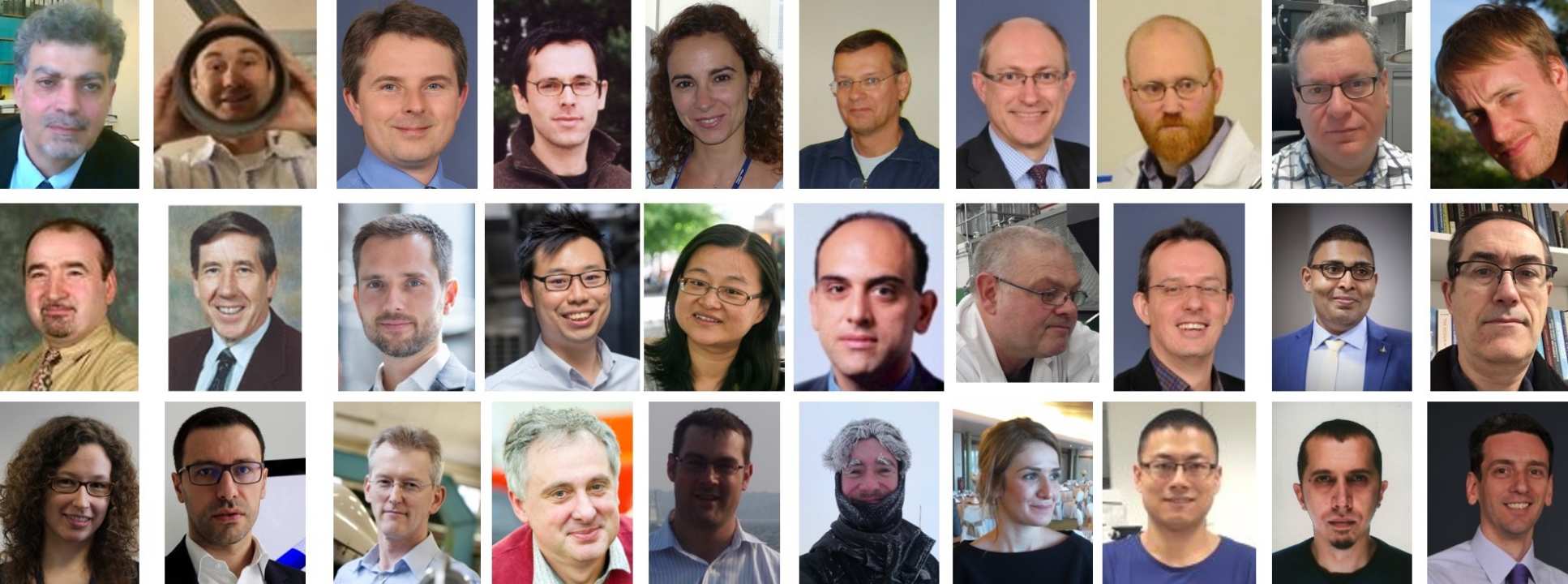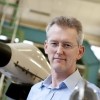
Professor M H Ferri Aliabadi

Chair in Aerostructures
Prior to joining Imperial College in 2005, he was Professor of Computational Mechanics and the Director of Aerospace Engineering at Queen Mary, University of London (1997-2004) and Reader and Head of Damage Tolerance Division at WIT, Southampton (1987-1997).
Head of Department of Aeronautics, Imperial College (2009-2017)
Professor Alexander Bismarck
Professor of Advanced Materials
My research group, the Polymer & Composite Engineering (PaCE) Group, is a multi-disciplinary team with research interests in the manufacture and characterisation of fibre reinforced high performance (nano) composites, porous materials and hydrogels. We focus on the the development of renewable materials, biomaterials for applications in tissue engineering, composite super-capacitors and emulsion templating for the synthesis of porous polymers (so called polymerisable High Internal Phase Emulsions (polyHIPEs)). Furthermore, the group is interested in the social dimensions of materials research.
Dr Bamber R K Blackman
Reader in the Mechanics of Materials
Bamber is a Reader in the Mechanics of Materials in the Department of Mechanical Engineering at Imperial College London. His research interests include the fracture mechanics of structural adhesive joints and polymeric fibre-reinforced composite materials, including effects of mode-mix, test rate, service environment and structure-property relationships. He chaired the Structural Technology and Materials Group (STMG) of the IMechE (2008-2010) and is secretary to the European Structural Integrity Society (ESIS) Technical Committee TC4 on Polymers, Adhesives and Composites where he also leads the structural adhesives activities. From 2006-8 he chaired the Structural Adhesives Division of the Adhesion Society. He was awarded the Rolls-Royce prize in December 2001 and has published over 50 refereed research papers and book contributions and has presented his research widely at international conferences. He has served as Guest Editor to the International journal, Engineering Fracture Mechanics on three occasions.
Dr Joao P Cabral
Reader in Soft Matter
My research interests are in soft condensed matter, in particular in complex polymer mixtures, multicomponent systems, often containing particles and copolymers. We study the thermodynamics and dynamics or polymer blends with a combination of real- and reciprocal-space techniques, including microscopy and AFM, and light, X-ray and neutron scattering.
We are interested in exploring microfluidics for soft matter processing, seizing their commensurate length and timescales. We are also interested in the patterning and device fabrication and explore ‘Frontal photopolymerisation’ (FPP) to rapidly create 3D structures that, moreover, are compatible with an array of organic solvents. We also developed a sound theoretical understanding of the nature of front propagation, which exhibits intriguing kinetics. In terms of applications, we work on microprocessing as a means to tune structure and performance of complex fluids, as well as interfacial tensiometry, and coupling of charcterisation approaches such as scattering.
Finally, we develop high-throughput and combinatorial approaches for polymer mixtures and network formation. We are now elaborating on scattering and spectroscopic tools to elucidate aspects of morphology and stability of elusive soft matter systems.
Professor Maria Charalambides
Professor in Mechanics of Materials
Dr Charalambides, CEng, FIMechE, is a Reader in Mechanics of Materials in the Department of Mechanical Engineering at Imperial College London. She is the head of the Soft Solids Research group. Prior to her appointment at Imperial as a Lecturer in 1997, she was a Research Associate in the same Department and a Senior Scientist at the National Physical Laboratory in Teddington, Middlesex.
Her published research includes material modelling and mechanical characterisation of soft polymeric solids and specifically foods, micromechanics models of particulate filled polymeric composites as well as cellular structures, experimental and numerical modelling of industrial food processes such as rolling, extrusion and cutting, development of inverse indentation methods material characterisation of polymers, and fracture and deformation in paint and adhesive coatings. She leads the Soft Solids research group. She is currently teaching Mechanics and Advanced Stress Analysis courses; she has lectured Mathematics and Composites Materials courses in the past.
Maria has published over 100 papers and has received funding from industry and RCUK . Her papers were selected as finalist for the 2013 Cahn Prize and Best paper for the IMechE Food Engineer Awards (2007 & 2011). She is the membership secretary of the British Society of Rheology and a Committee member of the Food and Drink Technical Committee of IMechE. Maria has a First Class B.Eng (Hons) in Mechanical Engineering from Imperial College London. She also holds a PhD in Mechanical Engineering, from Imperial College London, on the Delamination of fibre reinforced composites.
http://www.imperial.ac.uk/people/m.charalambides
@charalambides_m
Professor Paul T Curtis
Senior Research Investigator
Paul worked for 39 years as a Senior Fellow in Dstl (and its forerunner establishments RAE, DERA) and is a recognised world expert in the field of polymer composite materials, especially for aircraft structures. He has worked closely with industry, in particular aerospace suppliers Airbus and BAeS, in the development and exploitation of these materials. Having retired from MoD, he now has a part time role in the college. He is currently working on developing polymer composite protection materials.
Professor John P Dear
Professor of Mechanical Engineering
John has been an academic for 30 years in the Mechanics of Materials Division of the Department of Mechanical Engineering and is a Professor of Mechanical Engineering. Prior to joining Imperial in 1988, John was an SERC Research Fellow at the Cavendish Laboratory, Cambridge University where he did his first degree and PhD.
John has been successful in obtaining research grants from the UK and US Government (EPSRC, ONR, MRC & DTI/TSB), European Commission, UK and overseas companies. He is Executive Co-Director for the two AVIC Centres at Imperial College London. His research expertise is structural integrity of materials including manufacturing and micro-structural effects. He is Associate Editor of the International Journal of Lightweight Materials and Manufacture. He has published 331 journal and conference papers; contributed to 17 books, supervised 59 PhDs and 19 RAs. Examples include: impact performance of aerospace and automotive components, blast performance of laminated glass facades and composite structures, creep life of materials in power-station plant, water distribution plant and high-strain rate properties of polymers, composites and a wide range of other materials for defence applications and also for medical research.
John is currently Head of the Composites, Adhesives and Soft Solids (CASS) Group (comprising of eight academics). John is Executive Co-Director for the two AVIC Centres:
http://www.imperial.ac.uk/avic-design
Dr Barbara Gordon

Senior Research Investigator
Prior to joining Imperial, Barbara worked in industry for 38 years, principally in the field of aircraft composite structures. This has involved work across the whole product lifecycle. She currently works with a number of members of the group on a variety of topics from new material and product development, through qualification and certification issues to in service damage and repair.
Prof Emile S Greenhalgh CEng FIMMM
Professor of Composite Materials
Head of the Composites Centre
Director of the Composites MSc
A widely respected academic with over thirty years experience in initiating, developing, conducting and managing composites research whilst teaching over a wide range of aspects of fibre reinforced polymers and administrating the Masters course in Composites. He has a H-index of 27 (Google Scholar), having published fifty seven papers (3268 citations), two textbooks and four patents. His two areas of world leading expertise are in fractographic analysis of polymer composites and development of multifunctional (structural power) materials.
Dr Robert Hewson
Reader in Aircraft Design
My research spans a few areas and includes multiscale methods methods and design optimisation. I supervise a number of PhD students in collaboration with Airbus UK in the field of multiscale design optimisation and have a Royal Academy of Engineering Industrial Fellowship to work in this field from 2017 to 2018. The response surface methods developed and free material optimisation approaches used have a number of applications in composite structural design where fibre angle or lamination parameters replace the more typical pseudo-density encountered in topology optimisation methods.
Professor Anthony J Kinloch
Professor
Professor Tony Kinloch PhD, DSc (Eng), FCGI, FIMMM, FIMechE, FRSC, FREng, FRS holds a personal chair as 'Professor of Adhesion'. He was 'Head of the Department of Mechanical Engineering' from 2007 to 2012. He has published over two hundred patents and refereed papers in the areas of adhesion and adhesives, toughened polymers, nanocomposites and the fracture of polymers and fibre-composites; and written and edited seven books in these areas. Over eighty students have obtained their MSc and PhD Theses under his supervision, with over fifty of this number being PhD Theses. In 1992 he received the US Adhesion Society 3M Award for 'Excellence in Adhesion Science' and was elected a 'R.L. Patrick Fellow' of the Society in 1995. Also, in 1994 he received the Adhesion Society of Japan Award for 'Distinguished Contributions to the Development of Adhesion Science and Technology'. In 1996 he was awarded the 'Griffith Medal and Prize' from the Institute of Materials, UK, for his work on the application of fracture mechanics to studies of adhesion and adhesives, and in 1997 he was awarded the 'Hawksley Gold Medal' from the Institution of Mechanical Engineers, UK. In 2001, he was invited to give 'The Dow Honorary Lecture' of the University of Massachusetts, Amherst, USA. In 2002 he was awarded the 'Wake Memorial Medal' from the Institute of Materials, UK and named as 'R & D Scientist of the Year' by the US Adhesives Age Journal. He was elected President of the US Adhesion Society for 2002-2004. In 1997 he was elected a Fellow of the Royal Academy of Engineering. In 2007 he was elected as a Fellow of the Royal Society. In 2009 he was awarded 'The Royal Society Armourers & Brasiers' Company Prize for ‘Excellence in Materials Science and Technology’ and the 'Le Prix Dédale de la Sociéte Française d’Adhesion'.
Dr Mirko Kovac
Reader
I'm PI of the EPSRC Aerial Additive Building Manufacturing grant that aims at the development of a swarm of aerial robots to 3D print building structures autonomously. Additive Building Manufacturing (ABM) is already being trialled in many parts of the world and involves the use of large robots on a building site to 3D print (extrude) building materials to construct buildings. The research aims to miniaturise ABM and provide it with aerial capabilities so that it can be more mobile, and able to manufacture complex building structures while adapting to diverse site scenarios. This miniaturisation will also enable parallel production, where swarms of aerial printers working together could potentially reduce construction time and enable safer construction in hard-to access and dangerous conditions.
http://www.imperial.ac.uk/people/m.kovac
http://www.imperial.ac.uk/aerial-robotics
@AerialRobotics
Dr Koon-Yang Lee
Senior Lecturer in Composite Manufacture
My research focuses on the development and manufacturing of novel polymeric materials with a focus on tailoring the interface between two (or more) phases to bridge the gap between chemistry, materials science and engineering, with particular emphasis on:
- Cellulose and nanocellulose engineering
- Design and fabrication of renewable polymer composites and cellulose nanocomposites
- Surface and interface engineering to improve performance of high performance polymer (nano)composites
- Life-cycle assessment of composite materials
- Particle-stabilised emulsions and foams
- Novel manufacturing techniques for polymer foams
- Reuse, recycle and up-cycle waste materials
Dr Nan Li
Lecturer in Lightweight Design & Manufacturing
Dr Nan Li is a Lecturer at the Dyson School of Design Engineering. Her research addresses one of the major challenges facing the transportation industry world-wide: the development of breakthrough technologies to manufacture and design high-performance lightweight vehicles for a more environmentally-friendly footprint. Before joining Dyson School, Dr Nan Li did her PhD and PDRA research at the Department of Mechanical Engineering, Imperial College London. She is an innovative research scientist and has contributed ten patented technologies on novel low-cost materials processing technologies to produce high-strength, lightweight and complex-shaped panel components for vehicle structures from a family of advanced materials. Her main research focuses are:
- Innovative manufacturing process development for lightweight structures (e.g. forming Fibre Reinforced Thermoplastics sheets);
- Lightweight structural design and optimisation (e.g. hierarchical design based on structure-material-integrated optimisation for ultra-light composite aircraft;
- Design-led-manufacturing modelling (Performance driven optimum design of materials fabrication process enabled by advanced through-process modelling based on user-defined materials models)
Dr Qianqian Li
Lecturer in Composites
Dr Li has 10 years experience leading research in composite manufacturing, process optimisation and product analysis. She has proven track record on both metal and polymer composite development. Her primary research interests in lightweight composite fabrication, especially reinforced with nanoparticles. Other interests include the dispersion of nanoparticles in different matrices and advanced manufacturing processes such as additive manufacturing.
Due to her contribution in the field, she was granted the membership of the ""Cluster of Excellence Engineering of Advanced Materials"" at University of Erlangen-Nuremberg, Germany (2011 - 2013) and she is currently granted the membership of ""EPSRC manufacturing the future Early stage Career Forum"" (ECF) from 2018-2011.
Dr Luke A Louca
Reader in Engineering Structures
Dr Luke Louca is a senior lecturer in structural engineering in the Department of Civil and Environmental Engineering at Imperial College London. He is engaged in teaching at both undergraduate and postgraduate level in both structural steel design and mitigating the effects of explosions on structures.
He is also actively engaged in research with a strong contingent of students currently registered for a PhD. His principal research interests, where he has published some 40 papers in leading journals and conferences, lie in the area of behaviour and design of structures subjected to explosions. Much of this has focussed on steel structures for offshore applications but is currently actively engaged in both civil and defence applications using both traditional construction materials and fibre reinforced composite structures.
Although much of his work is computational, laboratory testing of small scale specimens is also being conducted under dynamic loading. Large scale testing has also been carried out off-site with a number of sponsors where he has been involved in the design of the tests. Much of the work is funded by the EPSRC, Dstl/MoD, Health and Safety Executive and the Office of Naval Research (USA).
Prof Rafael Palacios
Professor in Aeronautics
Composite materials have opened the design space in aircraft wings and wind turbines. My research is concerned with shaping the aeroelastic behaviour on those platforms, in the dynamic interactions between deforming structures, the surrounding fluid, and feedback control systems. For that we have had to develop homogenisation models suitable for slender composite structures, which identify effective material properties for highly nonlinear aeroelastic simulations, and we have used them to investigate the combined effect of aeroelastic tailoring (changing composite layup to shape the aeroelastic behaviour) and feedback control (through blade-mounted flaps) to optimize performance of offshore wind turbines in adverse atmospheric conditions.
Dr Ajit Panesar
Lecturer in Design for Innovative Manufacturing
Dr Ajit Panesar has more than 10 years experience in applying computer methods to progress two of the most promising and innovative manufacturing technologies of our time additive manufacture (AM) and composite tow steering. The core of his research so far has been the use and development of optimisation algorithms and numerical methods, to establish a framework for novel design tools that exploit the opportunities offered by these promising technologies. His interests include:
- Topology Optimisation (TO) & Lattice Structures
- Design for Variable Stiffness Composites
- TO for Anisotropy
- Efficient Analysis Techniques
- Multi-functional Design Optimisation
Dr Joaquim Peiro
Reader in Aerodynamics
Development of a methodology of the CFD simulation of moulding processes. It has been successfully applied to the modelling of the RTM (resin transfer moulding) processes employed in the manufacturing of propeller blades and the quantitative evaluation of mould filling times for realistic geometries.
Dr Soraia Pimenta
Lecturer
Soraia’s scientific contributions to the field of Composites fall under two main umbrellas: (i) developing original, accurate and efficient models for the mechanical response of composites, and (ii) promoting a new generation of manufacturable, damage tolerant and sustainable composites. Soraia has contributed to the state of the art on a wide-range of composites (virgin & recycled, continuous & discontinuous, non-hybrid & hybrid), for a variety of load cases (tension & compression, static & fatigue), demonstrating diverse capabilities (experimental & analytical & numerical, at the micro- & meso- & macro- scales).
https://www.imperial.ac.uk/people/soraia.pimenta
@meComposites
Professor Silvestre Taveira Pinho
Professor in the Mechanics of Composites
Upon completing my PhD (2005), I was recruited as a lecturer at Imperial College, and became in 2015 full Professor. My main contributions include;
- Experimentally isolating failure modes in composite materials, and then developing analytical models to simulate them;
- developing numerical models to represent failure, namely smeared-crack, cohesive and floating-node models;
- developing tests to measure the fracture energy associated with translaminar fracture;
- developing more damage-tolerant composites via engineering their fracture surface.
In 2010, the European Society for Composite Materials (ESCM) rewarded me with the ESCM award to recognise the accomplishments of a young researcher active in Europe, who has made significant contributions in the field of composites. I led a team to win an international benchmark on failure prediction for composite materials the 2nd World-Wide Failure Exercise. In 2010, I was invited by the Department for Business, Innovation & Skills to join the Sustainability & Recycling Consortium, where I advocated for responsible and sustainable research in Composites.
In 2012 I became the youngest member of the Executive Committee of ESCM and in 2017 of the Executive Council of the International Community for Composite Materials. I am a member of the RAeS Structures & Materials Specialist Group (since 2018) and of EPSRC Engineering Forum (since 2015).
My models are commercialised worldwide (e.g. Abaqus and LS-Dyna), and custom models are used by different institutions. An experimental test to measure translaminar toughness which I have developed is the most widely used test to measure this property.
http://www.imperial.ac.uk/people/silvestre.pinho
http://wwwf.imperial.ac.uk/aeronautics/research/pinholab/
@silvestretpinho
Professor Paul Robinson
Professor of Composites
Head of Department of Aeronautics
Paul Robinson is a Professor in the Mechanics of Composites and head of the Department of Aeronautics at Imperial College London. He joined Imperial College in 1988 as a lecturer having previously worked for Buro Happold Consulting Engineers and British Aerospace Space and Communications Division as a structural engineer.
His research interests lie in polymer matrix composites. His earlier work had a particular focus on the susceptibility of these materials to delamination and included the development and investigation of tests for characterising delamination resistance and methods for predicting delamination development in composite components due to static, impact and fatigue loading. More recently his research has included development and investigation of ductile composite architectures (he is a co-I on the EPSRC Programme Grant High Performance Ductile Composite Technologies), morphing structures, and controllable stiffness and shape memory composites. He is also a co-I on the Clean Sky 2 project "Structural Health Monitoring, Manufacturing and Repair Technologies for Life Management of Composite Fuselage" (SHERLOC).
Professor Eduardo Saiz Gutierrez
Professor of Structural Ceramics
The group works on the design, fabrication and characterisation of ceramic-based composites. Areas of interest include the additive manufacturing of fibre-reinforced composites or composites with complex bio-inspired industry. The group has also worked on graphene-containing composites that combine structural and functional capabilities (self-healing, shape changing, self-monitoring, high electrical and thermal conductivity). One of the areas of interest is the in situ mechanical testing of materials in the electron microscope to identify toughening mechanisms
Dr Matthew Santer
Senior Lecturer
I have carried out research into the behaviour of high strain composite (HSC) flexures for deployable space structures. Using thin ply laminates, self-deploying self-locking flexures have been investigated and developed. This work has been funded by the US Air Force Research Labs, Airbus Defence and Space, and DSTL.
Prof Milo S P Shaffer
Professor of Materials Chemistry
Milo Shaffer is Professor of Materials Chemistry at Imperial College London, and co-Director of the London Centre for Nanotechnology. He has extensive experience of carbon and inorganic nanomaterials synthesis, modification, characterisation, and application, particularly for nanocomposite and hierarchical systems, including both structural matrices and conducting polymers for electrochemical and photovoltaic applications. Notable recent work includes new, patented methods for the dispersion, surface functionalisation and characterisation of carbon nanomaterials, and new approaches to the synthesis of functionalised oxide nanoparticles in situ. In general, exploitation of nanomaterials is limited by difficulties in synthesis and processing, and research focuses on these problems. Milo has previously spent time working as a materials technology consultant in the areas of new technology development and exploitation, and holds around twenty patents, seven of which are licensed commercially. He has published over 100 peer-reviewed papers with a total of over 7000 citations, h-Index 41. He was awarded the Royal Society of Chemistry Meldola medal in 2005 and a prestigious EPSRC Leadership Fellowship in 2008. He sits on the RSC Materials Chemistry Division Council, and the editorial boards of Chemical Physics Letters and International Materials Reviews. He joined Imperial in 2003 from the University of Cambridge.
Dr Zahra Sharif Khodaei
Senior Lecturer
Dr Sharif Khodaei is a senior lecturer in Aerostructures. She obtained her PhD from Czech Technical University in Prague in numerical modelling of functionally graded materials in 2008. Her main area of research is in structural integrity and health monitoring with focus on damage detection and characterization in composite structures based on permanently mounted sensors on the structure. She has been involved in several EU projects (SMASH, SCOPE, SARISTU, SHERLOC) as part of FP7 and CleanSky funding scheme were methodologies and technologies for maintenance and repair of composite structure have been developed and tested based on building block approach.
Dr Siti Rosminah Shamsuddin
Teaching Fellow
Prior to joining the department, I was a Post-Doctoral Research Associate in Polymer and Composite Engineering (PaCE) Group, Department of Chemical Engineering from June 2012 until June 2016.
My research interest include manufacturing and characterisation of high performance fibre reinforced polymer composites and nanocomposites as well as interfaces in composite materials.
Dr Qilei Song
Lecturer
Dr Qilei Song is currently a Lecturer in the Department of Chemical Engineering at Imperial College London. The Song Research Group has research interests in design, synthesis, and characterisation of functional polymers and nanoporous materials for applications in membrane separations, adsorption, catalysis, and energy conversion and storage.
Dr Qilei Song received Bachelor's and Master's degrees in School of Energy and Environment at Southeast University (Nanjing, China) in 2006 and 2009, respectively. In October 2009, he joined the Department of Chemical Engineering at University of Cambridge working on nanostructured mixed metal oxides for combustion and low carbon energy processes (Energy Environ. Sci. 2013). In October 2010, he moved to the Cavendish Laboratory to pursue a PhD in Polymer and Soft Matter Physics at the Cavendish Laboratory. He passed the PhD viva in February 2014, and continued as a Postdoctoral Research Associate at the Cavendish Laboratory. During his PhD and Postdoc research, he worked on several types of cutting-edge microporous materials and their applications in membranes for gas separations, notably metal-organic frameworks (MOFs) and polymer/MOF composites (Energy Environ. Sci. 2012), polymers of intrinsic microporosity (PIMs) (Nature Communications, 2013; Nature Communications, 2014; Journal of Materials Chemistry A, 2016), and novel porous molecular materials known as porous organic cages (Advanced Materials, 2016). He joined the Department of Chemical Engineering at Imperial College in November 2014 to pursue an independent research programme. He worked closely with Prof. A. G. Livingston on microporous polymer nanofilm membranes (Nature Materials, 2016). In August 2016, he was appointed a Lecturer in Chemical Engineering in the Department.
Sustainable energy and clean environment are key global challenges in the 21st century. Dr Song's research interests are focused on design and synthesis of porous materials for energy and environmental applications, in applications such as membranes for molecular separations, heterogeneous catalysis, combustion, and energy conversion and storage. A broad scientific approach is used aiming to understand their physical and chemical properties that dominate the processes of molecular and ionic transport, adsorption/absorption and diffusion, and chemical reactions.
Dr Vito Tagarielli
Reader
I am a mechanical engineer with a passion for mechanics of solids and applied mechanics. My research approach integrates modelling and experimentation. Over the past two decades I have worked at Cambridge, Oxford and Imperial and much of my research has examined the response of different types of composite materials. My main contributions to research in composites have focused on:
- measuring, modelling and optimizing the dynamic response of monolithic and sandwich composites to intense dynamic loading, such as that experienced in blast and impact events;
- fluid-structure interaction in underwater blast events;
- new experimental methods for the characterization of composites and foams at high rates of strain;
- the electro-mechanical response of conductive CNT-polymer composites;
- stochastic modelling of composites and new numerical modelling strategies and advanced characterization techniques to capture size dependence and intrinsic uncertainty of the mechanical response of these materials.
Dr Ambrose Taylor
Reader in Materials Engineering
Ambrose is a Reader in Materials Engineering, and is the leader of the ‘Nanomaterials’ group which specialises in the characterisation and modelling of particle-modified thermoset polymers. He has researched the impact and durability performance of rubber-toughened structural epoxy adhesives, and quantitatively predicted the lifetime of adhesive joints in fatigue. His current work is investigating the structure/property relationship of thermoset/inorganic hybrids, using epoxy, acrylic and cyanate ester polymers. He also has interests in using other nanomodifiers (e.g. layered silicates, carbon nanotubes and silica nanoparticles) as tougheners for thermosets. He is also investigating the microstructure and properties of epoxy adhesives modified with combinations of micro- and nanoparticles. The applications of these materials include structural adhesives, coatings and as the matrices of fibre-composite materials. He has held a prestigious Royal Academy of Engineering Post-doctoral Research Fellowship and a Royal Society Mercer Award for Innovation.
Contact us
The Composites Centre
Imperial College London
South Kensington Campus
London
SW7 2AZ
United Kingdom
Email: ae.composites@imperial.ac.uk

